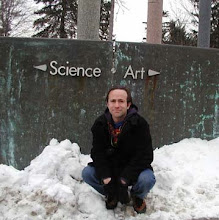Quick thoughts
Recent readings dealing with dualities, splits in our thinking and zipping them back into something whole. Last week in regards to the split of Plato’s cave, referred to Pirsig’s Zen and the Art of Motorcycle Maintenance as dealing with Plato and his fight against sophists. (http://nstctc.blogspot.com/2009/04/zenmm-in-connection-to-plato.html This comes up early in Latour’s essay as he sets out to reverse the split that story put into place in Western thought. This also brings to mind EO Wilson’s idea of “consilience” in his book of the same name. He defines the term (an existing word he retooled for his use) as involving the integration of multiple disciplines to establish a “common groundwork of explanation.” Wilson proposes that only when the disciplines come together can the problems that affect the world be appropriately addressed, writing “Only fluency across the boundaries will provide a clear view of the world as it really is, not as seen through the lens of ideologies and religious dogmas or commanded by myopic response to immediate need.”Wilson also warns that “A balanced perspective cannot be acquired by studying disciplines in pieces but through pursuit of the consilience among them.”
In my head, Latour and Wilson are talking the same thing. Latour is bringing down Science from this mythical place and making it unsmooth, messy, rhizomatic, and connected to our experience so that real conversation can happen. Wilson is talking about the danger of specialization (as initially voiced by CP Snow in “The Two Cultures”) that arose from the failure of the Enlightenment where no one knows how to talk to each other. With the idea of Consilience and Latour’s “political ecology,” a common framework is established, a means to have a dialogue and actually tackle issues that both men are passionate about – the health of our species and the health of this planet. All that said, Wilson’s use of “Science” may set Latour off, though I’m less clear what might upset Wilson. Having heard Latour I wondered why he didn’t mention Wilson, so curious to gain a better understanding of the difference in their arguments. (http://nstctc.blogspot.com/2009/02/bruno-latour-lecture.html) As someone who’s used Wilson’s work in my own work, I know I’ve gotten flack from social science folks who are angry with him about sociobiology – which personally, I don’t think they understand. Wilson rocks – a delightful, endlessly inquisitive man, as Latour also seems to be. I’d love to hear a conversation between them. Perhaps I’ll have to imagine it.
No comments:
Post a Comment